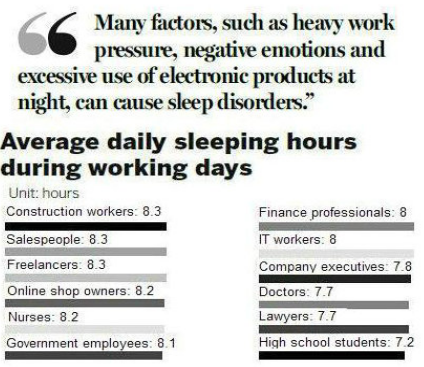题目内容
11.What is your first language?The first language of all humans is touch.It was a winter day and I was (41)Chome from work.It was (42)Band windy.I crossed my arms against my body,trying to make myself warmer.
Then I (43)Aher.She was walking in front of me on the sidewalk.Well,she was not really walking,more like (44)Dher feet along in her house slippers.
As I passed her,she turned and smiled.Her (45)Blighted up her face.I saw that she was well into her 80s,maybe even early 90s.And she was holding some letters in her hands.
I walked on and arrived at the (46)D.Waiting there,I saw the (47)Cacross the street.The light turned green for me to cross the (48)A.But I pretended to check my phone and waited for her to (49)B.In this neighborhood,(50)Ccrossing with the green light was dangerous.Drivers often drove (51)Dthrough red lights and stop signs.
When she reached me on the sidewalk,we (52)A,side by side,for the light to change.I wanted to speak to her,but I was not sure.People were often untrusting of (53)Din the city.But I turned to her and (54)Ctouched her on the arm."Excuse me ma'am.Can I help you?"
She smiled and answered in a (55)BI did not understand.But then she waved her hand as if to say,"We don't need to talk,my dear."
She took my hand in hers and held it.Her small hand was (56)Aand warm.So,now we were waiting hand-in-hand for the light to change.
The light changed (57)Cwe walked together slowly across the street.I (58)Bthe letters in the mailbox and (59)Aher back across the street.When safely across,she said"thank you"in beautifully accented English and (60)Dgood-bye.
| 41.A.driving | B.leaving | C.walking | D.staying |
| 42.A.warm | B.cold | C.rainy | D.sunny |
| 43.A.noticed | B.helped | C.watched | D.realized |
| 44.A.pushing | B.lifting | C.keeping | D.dragging |
| 45.A.joy | B.smile | C.kindness | D.behavior |
| 46.A.store | B.sidewalk | C.street corner | D.traffic light |
| 47.A.policeman | B.sign | C.mailbox | D.driver |
| 48.A.street | B.ground | C.square | D.line |
| 49.A.calm up | B.catch up | C.speed up | D.turn up |
| 50.A.ever | B.never | C.even | D.yet |
| 51.A.swiftly | B.slowly | C.noisily | D.wildly |
| 52.A.waited | B.chatted | C.remained | D.stood |
| 53.A.women | B.customers | C.passengers | D.strangers |
| 54.A.quickly | B.heavily | C.gently | D.suddenly |
| 55.A.voice | B.language | C.sound | D.way |
| 56.A.soft | B.white | C.hard | D.rough |
| 57.A.but | B.if | C.and | D.as |
| 58.A.threw | B.dropped | C.filled | D.folded |
| 59.A.took | B.held | C.brought | D.carried |
| 60.A.moved | B.shook | C.nodded | D.waved |
分析 本文讲述的是人类的第一语言应该是触摸,作者通过自己的一次亲身经历告诉我们一个关爱的触摸可以使糟糕的情况变得充满希望并让人难忘.
解答 41-45 CBADB 46-50 DCABC 51-55 DADCB 56-60 ACBAD
41.C 考查动词词义辨析 根据下文I walked on and arrived at the (46)____可知,作者是下班后步行(walking)回家,故答案为C.
42.B 考查形容词词义辨析 根据上文的winter及下文I crossed my arms against my body,trying to make myself warmer.可知,那时是冬天,非常寒冷,故答案为B.
43.A 考查动词词义辨析 根据上下文可知,然后我注意到(notice)她,故答案为A.
44.D 考查动词词义辨析 根据上下文语境可知,她实际上不是在走,更像是穿着拖鞋在地上拖行(dragging),故答案为D.
45.B 考查名词词义辨析 根据前文As I passed her,she turned and smiled,可知此处应该是她的微笑在脸上浮现,故答案为B.
46.D 考查名词词义辨析 根据下文The light turned green for me to cross the (48)____可知,是作者来到了交通灯处,故答案为D.
47.C 考查名词词义辨析 根据上文And she was holding some letters in her hands.可知,"我"注意到马路对面有一个邮箱,故答案为C.
48.A 考查名词词义辨析 根据常识可知,灯变绿了,该我过街道了,故答案为A.
49.B 考查动词词义辨析 根据语境可知,我"在那里等着她直到她可以跟上(catch up),故答案为B.
50.C 考查副词词义辨析 根据下一句可知,在这个地区,甚至绿灯时通行也是危险的,故答案为C.
51.D 考查副词词义辨析 根据前一句 dangerous,因为红灯亮着司机也会野蛮地(wildly)开车通过,故答案为D.
52.A 考查动词词义辨析 我们"肩并着肩等着交通灯变颜色,故答案为A.
53.D 考查名词词义辨析 根据常识,在城市中,人们往往不相信陌生人,故答案为D.
54.C 考查副词词义辨析 我转向她,轻轻碰了一下她的胳膊,故答案为C.
55.B 考查名词词义辨析 根据第一段The first language of all humans is touch.可知,此处应该是她用我不懂的语言回答我,故答案为B.
56.A 考查形容词词义辨析 她小小的手非常柔软和温暖,故答案为A.
57.C 考查连词词义辨析 灯变绿了,然后我们一起慢慢地走过了路口,故答案为C.
58.B 考查动词词义辨析 当"我们"过完马路后,"我"将信投(drop)到了邮箱里.
59.A 考查动词词义辨析 在"我"投过信后,"我"又扶着(took)她穿回了马路,故答案为A.
60.D 考查动词词义辨析 她用漂亮的英语口音对我说"谢谢"并向我挥手告别,故答案为D.
点评 非等距离挖空的命题方式是完形填空的最大特色.短文首句不挖空,以便为考生理解全文留下足够信息,命题者根据考查目的进行挖空,造成信息链中断,这就要求考生依据上下文的文意捕捉到空白处的缺词.从近几年高考完形填空题看,纯语法知识几乎不考,主要考查考生灵活运用所学词汇的能力,尤其是以考查实词或信息词为主,着重考查考生对文章的内在逻辑和整体把握能力.因此,把握句间和段落之间的内在逻辑关系,通过上下文暗示,对篇章、段落或句意的整体把握;再则,干扰项的设置与语法结构无甚关系,重在文意干扰.因此,把握文意和具体语境,通过对词义的辨析,是解完形填空的最好手段.

| A. | rose | B. | rises | C. | has risen | D. | is rising |
| A. | operate; where | B. | operating; which | ||
| C. | to operate; that | D. | operated; what |
